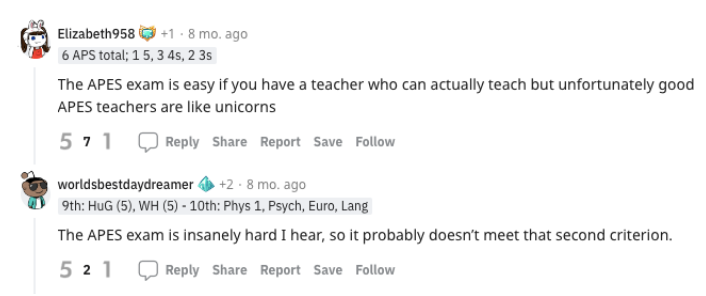We get it. You want to know the easiest AP classes because you want an A+ on your transcript and a 5 on the AP exam.
On top of that, at many colleges, scoring high in AP classes and on AP exams can help you stand out during the college admissions process and earn free college credit (and considering how expensive paying for college can be today, that’s a great bonus).
So, what are the easiest AP classes? Well, there is no easy answer. But you can look at data on AP exam pass rates, student reviews, and a few subjective factors to determine which might be the easiest AP classes for you.
And in this blog post, we’ll be looking at all of that information in addition to answering questions like:
Which AP classes should I take?
How many AP classes should I take?
Can I self-study for AP exams?
How do AP grades and test scores affect college admissions?
Let's begin!
What are the easiest AP classes?
There are a few ways to think about the question “What are the easiest AP classes?”: easiest by exam pass rates (courses like AP Art & Design and AP Calculus BC), easiest by student reviews and/or grades (e.g. AP Computer Science Principles or AP Human Geography), and how “easy” the course material and AP exam are relative to your knowledge base (AP Chinese is way easier if you already speak Mandarin…), your study habits and learning tendencies, and the strength of your teachers. But those ways to think about “easiest AP classes” sometimes contradict each other. So let’s dive into some detail.
Easiest AP exams by pass rate
According to data from the College Board (the organization behind the AP curriculums and exams), the following exams had at least a 70% pass rate (a score of 3 or higher):
AP Art & Design: Drawing
AP Art & Design: 2-D
AP Calculus BC
AP Chinese Language
AP English Literature
AP French Language
AP Government & Politics
AP Italian Language
AP Japanese Language
AP Physics C Mechanics
AP Research
AP Seminar
AP Spanish Language
Does that mean these are the easiest AP exams? Depends on how you define “easy.” We’ll explain why we say that in a minute. But first, we know you’re probably curious to see a full list of the 2022 AP exam pass rates for all the AP subjects. So, here it is:
| AP Subject | Pass Rate (Exam Score of 3+) |
Median Score |
|---|---|---|
| AP Art & Design: Drawing | 88.3% | 3.54 |
| AP Art & Design: 2-D | 86.6% | 3.43 |
| AP Art & Design: 3-D | 73.6% | 3.12 |
| AP Art History | 61.5% | 2.99 |
| AP Biology | 67.9% | 3.11 |
| AP Calculus AB | 55.7% | 2.91 |
| AP Calculus BC | 76.9% | 3.68 |
| AP Chemistry | 54% | 2.73 |
| AP Chinese Language | 86.9% | 3.97 |
| AP Computer Science A | 67.5% | 3.2 |
| AP Computer Science Principles | 63.5% | 2.91 |
| AP Economics - Macro | 51.8% | 2.71 |
| AP Economics - Micro | 59% | 2.93 |
| AP English Language | 55.7% | 2.83 |
| AP English Literature | 77.9% | 3.31 |
| AP Environmental Science | 53.8% | 2.79 |
| AP European History | 58.9% | 2.95 |
| AP French Language | 71.6% | 3.16 |
| AP German Language | 65.5% | 3.13 |
| AP Government & Politics Comparative | 70.5% | 3.14 |
| AP Government & Politics United States | 48.6% | 2.58 |
| AP Human Geography | 53.2% | 2.7 |
| AP Italian Language | 70.5% | 3.26 |
| AP Japanese Language | 75.5% | 3.65 |
| AP Latin | 57% | 2.77 |
| AP Music Theory | 61.9% | 3.03 |
| AP Physics 1 | 43.3% | 2.47 |
| AP Physics 2 | 69.7% | 3.14 |
| AP Physics C E&M | 69.4% | 3.44 |
| Ap Physics C Mechanics | 73.4% | 3.41 |
| AP Psychology | 58.3% | 2.71 |
| AP Research | 82.7% | 3.3 |
| AP Seminar | 82.6% | 3.19 |
| AP Spanish Language | 81.7% | 3.54 |
| AP Spanish Literature | 64.2% | 2.91 |
| AP Statistics | 60.5% | 2.89 |
| AP United States History | 48.2% | 2.57 |
| AP World History | 62.1% | 2.96 |
Easiest AP exams by student reviews
Of course, exam pass rates and median scores can only tell you so much—AP Japanese had a very high median score (3.65) and pass rate (75.5%), but a lot of those students were probably already fluent. So, let's also look at some student reviews of AP exams.
As far as we know, there’s no official survey or database of student reviews of AP classes and exams. But we did a bit of digging on Reddit in r/APStudents and found that students frequently mentioned the following AP classes and exams as being the easiest:
AP Computer Science Principles
AP English Language
AP Environmental Sciences
AP Government
AP Human Geography
AP Psychology
AP Statistics
Does this list match the data you just viewed in the table above? Nope! Student reviews on Reddit say AP Human Geography is easy yet the data shows that nearly half of students who took the last AP exam didn’t receive a passing score. How is that possible?
Well, for starters, student reviews are subjective and should be taken with a grain of salt—especially when they don’t come from students at your school. For every person that says a class like AP Statistics or AP Environmental Sciences is the easiest AP class, there’s someone else that says:
More importantly, the data and student reviews don’t match because the word “easy” is also subjective. And you know what that means? The easiest AP classes for you will depend on other factors—some of which are out of your control.
Things to consider when looking for “easy” AP classes
You want “easy” classes. But what’s easy for you may not be easy for your friend or the student at the high school on the other side of the country or the world.
So, really, your question shouldn’t be, “What are the easiest AP classes?” but rather, “What are the AP classes that might be easier for me?” And the answer to that second question depends on things like:
Your background knowledge and interest in the subject
Some students argue that AP Computer Science Principles is one of the easiest AP classes, since it focuses on foundational computer science concepts rather than specific languages or other advanced topics. However, this may not be true for everyone, especially if you haven't had much prior exposure to computer science.
The pass rates and student reviews of AP language classes can also be misleading. For instance, although the AP Chinese Language exam has a pass rate of 86.9%, you have to keep in mind that some of the students who take the exam are native speakers or have had regular exposure to the language from an early age. In fact, when you remove the scores from students who use the language outside of the classroom, the pass rate for AP Chinese Language drops to 64.8%.
The same could be said for nearly all of the other AP language exams. So, if your exposure to any of those languages has only been in the classroom, you may find that the classes and exams are more difficult than you expected.
The strength of your AP teachers
Another factor to consider when thinking about the easiest AP classes is the strength of your teachers. According to the data, 76.9% of students passed the last AP Calculus BC exam. But if you have an inexperienced or unqualified teacher for your AP Calculus class, it might be challenging to learn the material you need to succeed in that class and pass the exam—even if it's considered easy by others.
Another thing to consider is that just because an AP class at your high school is easy, that doesn't mean the corresponding AP exam will be. Similarly, a more difficult class may have a relatively easier exam. And that type of mismatch could simply be a reflection of who is teaching the class.
Your learning style
Some students find classes like AP Biology or AP Chemistry easy, as these types of classes rely heavily on the memorization of facts and concepts. However, students who are more analytical or good at problem-solving might have an easier time with AP Statistics or AP Computer Science.
The same can be said of your preferred test-taking style. While the AP English Language or AP US History exams require you to analyze and write essays about complex texts and historical documents, the AP Physics or AP Chemistry exams are more suited to students who prefer to work with numbers or formulas.
You see what we're getting at? There is no way to determine the “easiest” AP classes or exams for every student. So, how do you decide which AP classes to take?
Bonus: sometimes, college credit
AP classes also offer the opportunity to take an exam at the end of the course, which can earn you college credit or advanced placement in some programs. But the exact score and requirements for college credit will vary depending on the school and program. Typically, you'll need to score a 3 or higher on the exam to receive college credit.
Some colleges don't offer any credit for AP classes but will use your scores to place you in higher-level courses or exempt you from certain requirements. For example, if you take an AP English course and score high enough on the exam, you may be able to earn college credit or skip a lower-level writing course. Because things vary from school to school, you’ll want to double check as you build your college list.
Which AP classes should I take?
Ultimately, because there’s no one-size-fits-all answer here, the best advice is to carefully consider factors like your past academic performance, your interests, and what you might consider listing as your intended major on college applications. Additionally, it can be helpful to talk to your teachers, guidance counselors, and other students at your school about which AP classes might be the best fit for you.
How many AP classes should I take?
That will depend on a variety of factors, including the requirements and expectations at your school, as well as your own goals, preferences, and other commitments (e.g. extracurricular activities). Another thing to consider is the selectivity of the colleges you’re hoping to apply to—as a general rule, the more selective a college (e.g. hi 3.95% at Stanford), the more the rigor of your high school course load will matter (more on that below). Some students find that taking one or two AP classes per year is a good balance for their studies and workload, while others opt to take more AP classes to gain a competitive edge on their college applications.
Can I self-study for AP exams?
Yes, you can self-study for AP exams without taking the related AP class. But keep in mind that self-study can be challenging, especially if you are new to the content covered on the exam. You'd also have to balance self-study with your other coursework and commitments, so it's important to set clear goals and expectations for yourself as you begin.
How do AP grades and test scores affect college admissions?
College admissions officers care more about the rigor of your high school coursework than they care about how many AP classes you took or how well you scored on the AP exams.
For example, if you look at the UCLA admissions requirements, you won’t find anything about AP classes being required for admission. However, you will find that the rigor of your secondary school record is considered "Very Important" for admissions decisions.
That being said, at many high schools, AP classes are the most rigorous courses available. So, if you take several AP classes, get good grades, and score well on the corresponding AP exams, this can be a strong indicator of your academic readiness for college.
On the other hand, if your high school offers many AP classes and you only take one or none of these classes, your college applications may suffer as a result because of the perception that you weren't willing or able to tackle a rigorous course load.
If you pass the AP exams, many colleges also offer credit or placement into higher-level courses, which, as we mentioned, can save you time and money in the long run. But, again, this is not a requirement for admission. It's also not guaranteed since every college has its own policies when it comes to AP credits.
Final thoughts
Easy or not, AP classes are a great way to challenge yourself and show college admissions that you're motivated and willing to take on difficult coursework. And, if you do well in the class and on the exam, it can give you a competitive advantage for admission and potentially earn you college credit.
Still, it's important to remember that your coursework isn’t the only thing you should focus on when preparing to apply for college. You’ll need to also focus on creating a well-rounded application by also striving to develop a strong record of extracurricular activities, recommendation letters, application essays, and more. If you’re not sure where to begin with any of that, check out our step-by-step guide on how to apply for college!
That being said, if you can’t manage the workload of multiple AP classes and get bad grades as a result, you’ll hurt your chances of college admission. So, our advice is to take as many AP classes as you can realistically handle without sacrificing your grades and well-being.
Special thanks to Ameer Drane for writing this blog post.
Ameer is a freelance writer who specializes in writing about college admissions and career development. Prior to freelancing, Ameer worked for three years as a college admissions consultant at a Hong Kong-based education center, helping local high school students prepare and apply for top colleges and universities in the US. He has a B.A. in Latin American Studies from the University of Chicago and an M.A. in Spanish Linguistics from UCLA. When he’s not working, Ameer loves traveling, weight lifting, writing, reading, and learning foreign languages. He currently lives in Bangkok, Thailand.
Top values: Growth / Diversity / Empathy













